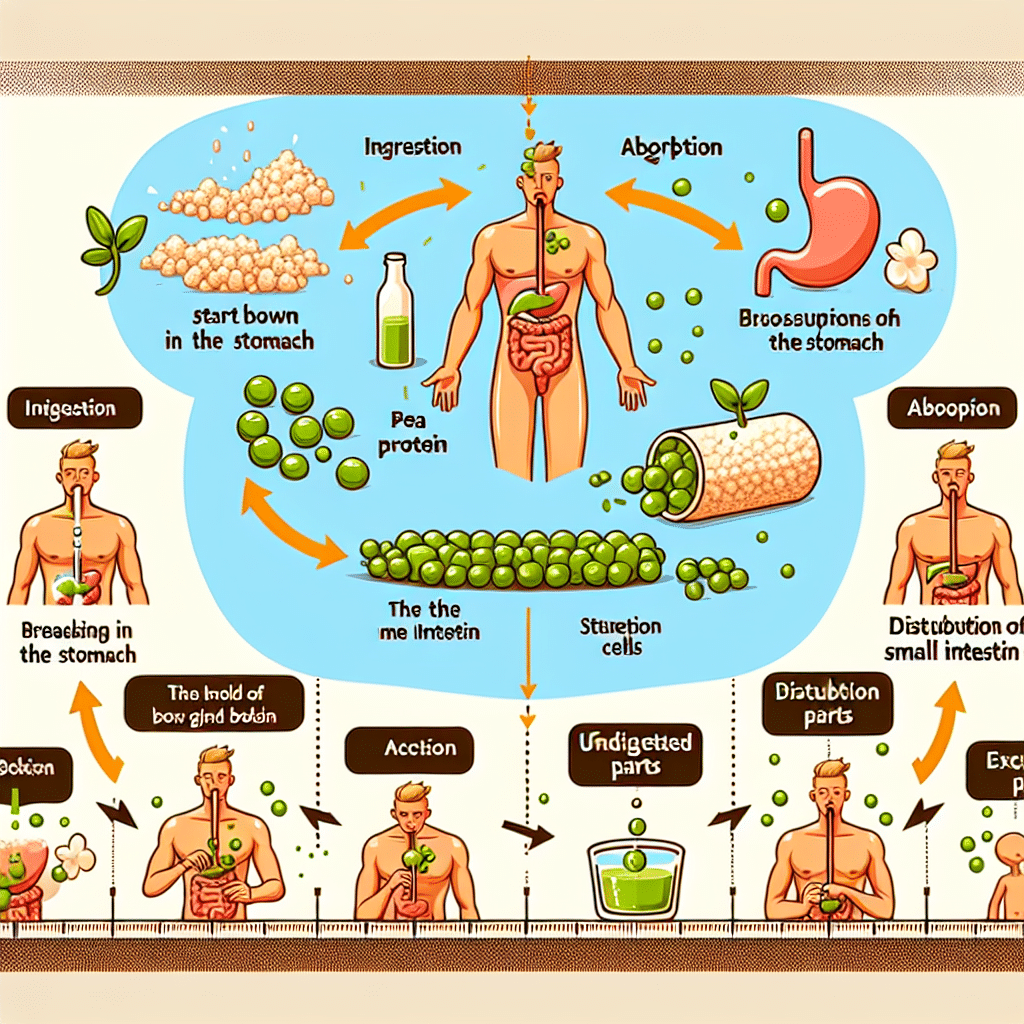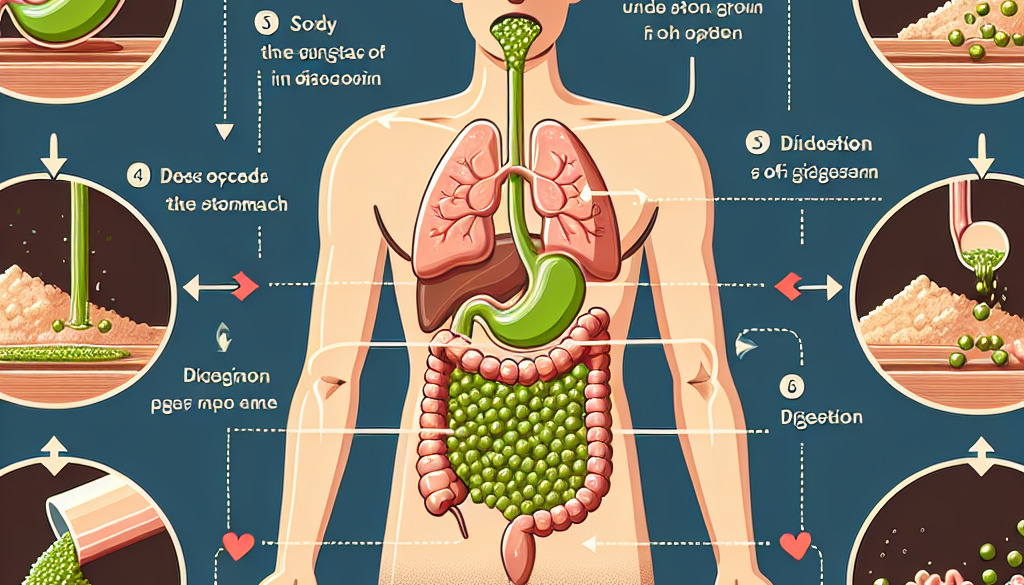How long does it take to digest pea protein?
-
Table of Contents
- Pea Protein Digestion Time: Understanding the Process
- What is Pea Protein?
- Factors Affecting Protein Digestion
- Digestion Time of Pea Protein
- Comparing Pea Protein to Other Proteins
- Nutritional Benefits of Pea Protein
- Applications of Pea Protein
- Conclusion: Key Takeaways on Pea Protein Digestion
- Discover ETprotein’s Premium Pea Protein Products
Pea Protein Digestion Time: Understanding the Process

Pea protein has become a popular alternative to animal-based proteins, especially among vegetarians, vegans, and those with dietary restrictions. As its popularity grows, questions about its digestibility and how it compares to other protein sources are becoming more common. This article delves into the digestion time of pea protein and provides insights into its nutritional benefits and applications.
What is Pea Protein?
Pea protein is a high-quality protein extracted from yellow split peas. It’s a complete protein, meaning it contains all nine essential amino acids required by the body for growth and repair. Pea protein is also hypoallergenic, making it a suitable option for individuals with allergies to dairy, soy, or gluten.
Factors Affecting Protein Digestion
Several factors influence the rate at which proteins are digested and absorbed by the body, including:
- Protein Type: Animal proteins are generally digested more quickly than plant-based proteins due to differences in their amino acid profiles and fiber content.
- Protein Form: Isolated proteins, like pea protein isolate, are digested faster than protein found in whole foods because they contain less fiber and other macronutrients that slow digestion.
- Individual Factors: Age, metabolism, and digestive health can all affect protein digestion rates.
- Meal Composition: The presence of other nutrients, like fats and carbohydrates, can slow down protein digestion.
Digestion Time of Pea Protein
The digestion time of pea protein can vary, but it generally takes about 2 to 4 hours for the body to break down and absorb most types of protein, including pea protein. This rate places pea protein in a moderate digestion category, slower than whey protein but faster than casein.
Pea protein’s rate of digestion is influenced by its fiber content and the presence of anti-nutritional factors, which can slow down the process. However, the isolation process used to create pea protein powder reduces these components, making it more digestible.
Comparing Pea Protein to Other Proteins
When compared to other protein sources, pea protein offers a unique balance of digestibility and nutritional value:
- Whey Protein: Whey is digested quickly, making it ideal for post-workout recovery. However, it’s derived from dairy, which can be problematic for those with lactose intolerance.
- Casein Protein: Casein is a slow-digesting protein that provides a steady release of amino acids, beneficial for muscle repair during sleep.
- Soy Protein: Soy protein is another plant-based option that is digested at a moderate rate, similar to pea protein, but it can be allergenic for some individuals.
Nutritional Benefits of Pea Protein
Pea protein is not only easily digestible but also packed with health benefits:
- It’s rich in branched-chain amino acids (BCAAs), particularly arginine, which promotes heart health and blood flow.
- Pea protein is beneficial for muscle growth and repair, making it a favorite among athletes and bodybuilders.
- It can aid in weight loss by promoting a feeling of fullness and reducing calorie intake.
- Being plant-based, pea protein is more sustainable and environmentally friendly than animal-based proteins.
Applications of Pea Protein
Pea protein is versatile and can be used in various dietary applications:
- Protein shakes and smoothies for a quick and convenient protein boost.
- Protein bars and snacks for on-the-go nutrition.
- Meat substitutes and plant-based products for those following a vegetarian or vegan diet.
- Baking and cooking as a protein-rich ingredient in recipes.
Conclusion: Key Takeaways on Pea Protein Digestion
In summary, pea protein offers a moderate digestion time, making it a suitable protein source for various dietary needs. Its complete amino acid profile, hypoallergenic properties, and nutritional benefits make it an excellent choice for those looking to incorporate more plant-based proteins into their diet. While individual digestion times may vary, the average range of 2 to 4 hours provides a steady supply of amino acids to support bodily functions and muscle repair.
Discover ETprotein’s Premium Pea Protein Products
If you’re interested in incorporating high-quality pea protein into your diet, ETprotein offers a range of organic and non-GMO pea protein products. Their clear pea protein is characterized by a neutral taste and is allergen-free, making it an ideal choice for various applications, from sports nutrition to health and wellness products.
ETprotein’s commitment to quality and sustainability ensures that you receive the best plant-based protein options available. To explore their offerings and find the perfect pea protein solution for your needs, contact ETprotein and sample their products today.
About ETprotein:
ETprotein, a reputable protein and L-(+)-Ergothioneine (EGT) Chinese factory manufacturer and supplier, is renowned for producing, stocking, exporting, and delivering the highest quality organic bulk vegan proteins and L-(+)-Ergothioneine. They include Organic rice protein, clear rice protein, pea protein, clear pea protein, watermelon seed protein, pumpkin seed protein, sunflower seed protein, mung bean protein, peanut protein, and L-(+)-Ergothioneine EGT Pharmaceutical grade, L-(+)-Ergothioneine EGT food grade, L-(+)-Ergothioneine EGT cosmetic grade, L-(+)-Ergothioneine EGT reference grade and L-(+)-Ergothioneine EGT standard. Their offerings, characterized by a neutral taste, non-GMO, allergen-free attributes, with L-(+)-Ergothioneine purity over 98%, 99%, cater to a diverse range of industries. They serve nutraceutical, pharmaceutical, cosmeceutical, veterinary, as well as food and beverage finished product distributors, traders, and manufacturers across Europe, USA, Canada, Australia, Thailand, Japan, Korea, Brazil, and Chile, among others.
ETprotein specialization includes exporting and delivering tailor-made protein powder and finished nutritional supplements. Their extensive product range covers sectors like Food and Beverage, Sports Nutrition, Weight Management, Dietary Supplements, Health and Wellness Products, and Infant Formula, ensuring comprehensive solutions to meet all your protein needs.
As a trusted company by leading global food and beverage brands and Fortune 500 companies, ETprotein reinforces China’s reputation in the global arena. For more information or to sample their products, please contact them and email sales(at)ETprotein.com today.












